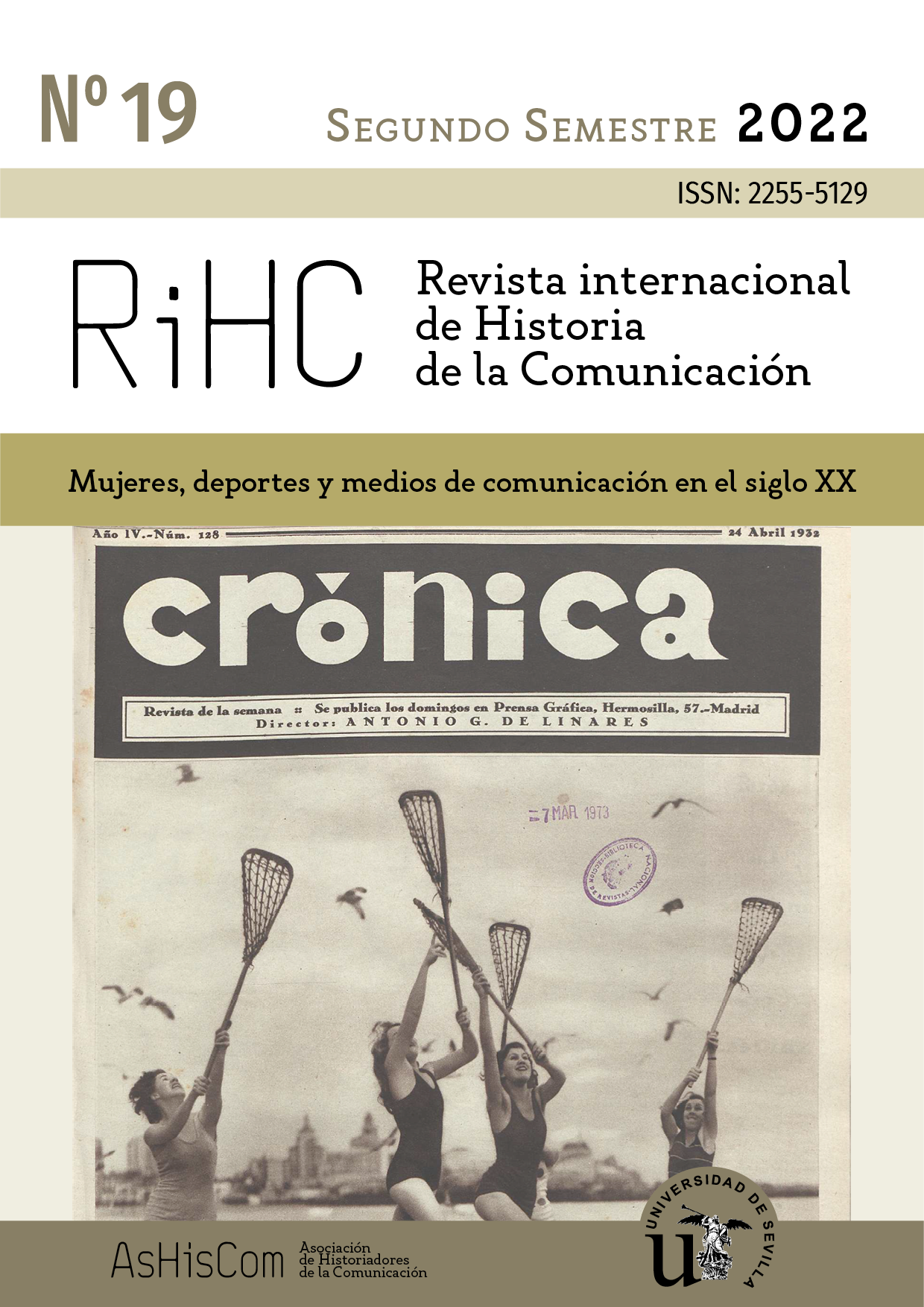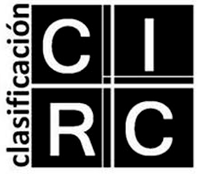Canarian women’s wrestling in the Canaries during the transition to democracy (1972-1984)
DOI:
https://doi.org/10.12795/RiHC.2022.i19.05Keywords:
Canarian wrestling, women, masculinity, democratic transition, sports sociologyAbstract
Canarian wrestling (lucha) is a traditional sport developed and practised in the Canary Islands and the areas of influence of the Canarian diaspora (especially Cuba, Argentina, Venezuela and the former Spanish colony of Western Sahara). As a wrestling or combat sport, masculinity is represented and made visible through multiple elements, as has been pointed out by some authors who have addressed the "wrestling sports-masculinity" binomial. Also coinciding with other wrestling sports, since the 1970s, the active presence of women practitioners and managers has been noted. It was an asymmetrical presence, both in the different countries and in the different forms of practice. It testified both to the transformations experienced within the sport and to the strength of the role and presence of women during the period. Canarian wrestling (lucha) also took part in this process, through the active and intense presence of women in a recognised and public way, in the period 1972-1984. This work attempts to show and explain the development of the process.
Downloads
References
ALONSO, V. L. (2022): A causa de la lucha: un análisis de la lucha canaria desde la perspectiva de la sociología histórica, Santa Cruz de Tenerife, Instituto de Estudios Canarios.
ALONSO, V. L. (2020): El deporte en Canarias durante la transición democrática española (1975- 1982), Espacio Abierto, vol. 29, nº 2, pp. 73-95.
ALZOLA, J. M. (1980): Víctor Grau-Bassas, primer conservador de el Museo Canario, Las Palmas de Gran Canaria, El Museo Canario.
ANTEQUERA, F. (1989): La lucha canaria en La Palma, Santa Cruz de Tenerife, Servicio de Publicaciones de la Caja General de Ahorros de Canarias.
BARRETO, C. M. (1996): Construyendo identidades: juegos y deportes tradicionales canarios, en AMADOR, F. et al. (eds.). I Congreso Internacional de luchas y juegos tradicionales, Madrid, Gobierno de Canarias, pp. 23-36.
CALLE, M. T. (2019): Historia del boxeo amateur y olímpico español en el período 1972-2000, Madrid, Universidad Autónoma de Madrid.
CURBY, D. G., y JOMAND, G. (2015): The evolution of women's wrestling: History, issues and future, International Journal of Wrestling Science, nº 5 (1), pp. 2-12.
DENZIN, N.K. (1970): Sociological Methods. A Sourcebook. Chicago, Aldine Publishing Company.
DÍAZ-NOCI, J. (2020): Guía de métodos de investigación aplicados al entorno digital. Una guía, en LOPEZOSA, C.; DÍAZ-NOCI, J.; CODINA, L. (eds.). Anuario de Métodos de Investigación en Comunicación Social, nº 1, Barcelona, Universitat Pompeu Fabra, pp. 4-19.
GARCÍA, M. (2006): Veinticinco años de análisis del comportamiento deportivo de la población española (1980-2005), Revista Internacional de Sociología, vol. LXIV, nº 44, pp. 15-38.
GARCÍA, T., GARCÍA, L., GONZÁLEZ, R., CARVALHO, J., y CATARREIRA, S. (2016): Revisión metodológica de la triangulación como estrategia de investigación, Atas - Investigação Qualitativa em Ciências Sociais, Vol. 3, pp. 639-648.
GIMÉNEZ, P.; GONZÁLEZ, M.; GUILLÉN, O.; HIGUERAS, J. (2012): Patrimonio histórico español del juego y del deporte: Federación Española de Luchas Olímpicas. En http://museodeljuego.org/investigaci%c3%b3n/patrimonio-hist%c3%b3rico/federaciones-deportivas/federaci%c3%b3n-espa%c3%b1ola-de-luchas-ol%c3%admpicas/ [consultado el 8 de octubre de 2022].
HANN, M., CHEVÉ, D., y WANE, C. T. (2021): Tying your ngemb”: Negotiating identity in Senegalese wrestling, Ethnography, nº22 (3), pp. 396-410.
HIRAI, S. (2014): La nostalgia: Emociones y significados en la migración trasnacional, Nueva antropología, nº 27(81), pp. 77-94.
JOMAND, G.; ÉPRON. A.; y LIOTARD, Ph. (2019): The Feminization of Wrestling: The Origins of Female’s Wrestling in Nord-Pas-de-Calais, 1971–1987, The International Journal of the History of Sport, nº 36 (17-18), pp. 1625-1641.
KARNINCIC, H., PENJAK, A., y CAVALA, M. (2016): Pink-Blue Gender Labelling: An Overview of the Origins of Inequality in Women’s Wrestling, The Anthropologist, nº 24 (3), pp. 844-852.
LAMAS M. (1999). Usos, dificultades y posibilidades de la categoría género, Papeles de población, vol. 5 (nº21), pp. 147-178.
LAPRADE, P., y MURPHY, D. (2017): Sisterhood of the Squared Circle: The History and Rise of Women's Wrestling, Toronto, ECW Press.
LÓPEZ, A. (2019): El tratamiento del judo femenino en la prensa española (1972-2012), Madrid, Universidad Complutense de Madrid.
LÓPEZ, C. (2017): Pioneiras do deporte en Galicia, A Coruña, Deputación da Coruña.
LÓPEZ, I. (1999): A través del caleidoscopio: identidad y localización cultural en textos autobiográficos hispanos en los Estados Unidos. City University of New York. En https://www.proquest.com/dissertations-theses/traves-del-caleidoscopio-identidad-y-localizacion/docview/304498387/se-2 [consultado el 9 de diciembre de 2022].
MARTÍN, J. M. (2016): La lucha canaria, sí, Santa Cruz de Tenerife, Le Canarien Ediciones.
RAMÍREZ, G. (2022): La educación física y el deporte como medios de transgresión del modelo de mujer durante la dictadura franquista, Movimento, nº 24, pp. 331-344.
RAMÍREZ, G. (2014): El Franquismo autárquico, la mujer y la Educación Física, Social and Education History, nº 3(1), pp. 78-102.
RIVERO, E. (2007): Crónicas de la lucha canaria. Historias del tiempo viejo, Santa Cruz de Tenerife, Parlamento de Canarias.
MANRIQUE, J. C. (2014): Incidencia del ideal de mujer durante el franquismo en el ámbito de la familia y la actividad física, Feminismo/s, nº 23, pp. 47-68.
NARDINI, D., y ÉPRON, A. (2021): “Being Breton through wrestling: Traditional gouren as a distinctive Breton activity”, Ethnography, nº 22 (3), pp. 372-395.
PUJADAS, X. y ABADÍA, S. (2020): Deporte, democratización y construcción ciudadana en España. Los límites de un proceso deslumbrante (1975- 2020), en PUIG BARATA, N. y CAMPS POVILL, A. (eds.). Diálogos sobre el deporte (1975- 2020), Madrid, INDE, pp. 49- 62.
RODRÍGUEZ, O. (2013): Cuento del domingo. “La lucharona”. Historia y personajes del sur de Tenerife. https://blog.octaviordelgado.es/
TÜRKMEN, M., y ARSTANBEKOV, S. (2020): “Kazakh traditional wrestling with its formation and transformation aspects: Kyres (Küres)”, European Journal of Physical Education and Sport Science, vol. 6 (8), pp. 79-90.
YANES, J. A. (2015): El maridaje fútbol/radiodifusión en las islas canarias durante el franquismo, 1939-1975, Revista Internacional de Historia de la Comunicación, nº 5, pp. 164-186.
Downloads
Published
How to Cite
Issue
Section
License
Copyright (c) 2022 RIHC. Revista Internacional de Historia de la Comunicación

This work is licensed under a Creative Commons Attribution-NonCommercial-ShareAlike 4.0 International License.
RiHC. Revista internacional de Historia de la Comunicación is an open access publication, offering its content under the principle that making research available to the public free of charge contributes to the greater exchange of global knowledge.
RiHC. Revista internacional de Historia de la Comunicación adheres to the various initiatives that promote access to knowledge. All content is therefore free of charge and is published under the Creative Commons Attribution-NonCommercial-ShareAlike 4.0 International license.
By virtue of this, the authors who publish in this journal accept the following conditions:
- Open access content may be freely shared (that is, copied and redistributed in any medium or format) and adapted (remixed, transformed and built upon).
- Attribution: The user of the content must give appropriate credit, provide a link to the license, and indicate if changes were made. This may be done in any reasonable manner, but not in any way that suggests the licensor endorses the user or their use.
- Non Commercial: The content may not be used for any commercial purpose.
- Share Alike: If the content is remixed, transformed or built upon, it must be distributed under the same licence as the original.
- No additional restrictions: No legal terms or technological measures may be applied that legally restrict others from doing anything the licence permits.













